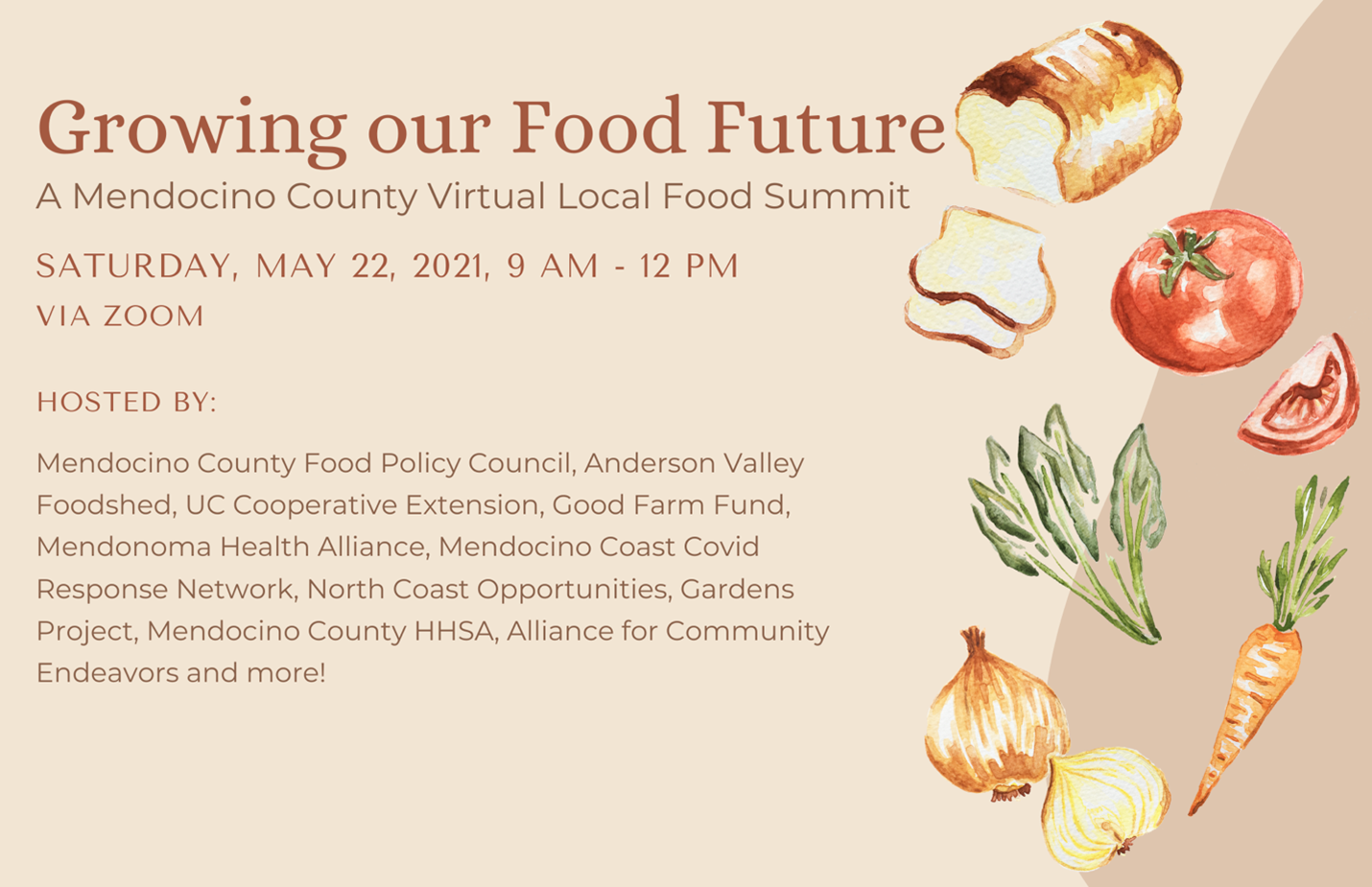Mendocino County Local Food Summit

By Jen Dalton, Kitchen Table Consulting, LLC
Local Food Summit Highlights Important Local Food Issues
The pandemic brought to the forefront the importance of regional and local food systems. A countywide Mendocino County Local Food Summit was held virtually on Saturday, May 22, 2021 to dive into the impacts of the pandemic on our local food system, and other important topics related to our local farmers, food supply and equitable access to that food. Designed and co-hosted by several county organizations, the Summit had over 60 virtual participants, representing farmers, food producers, health service professionals, small business owners, advocates, activists and policy professionals. Discussion covered a range of important topics over three hours; recent successes, opportunities resulting from the pandemic, challenges arising from climate change and water shortages, best practices to promote more equitable access to local food, and policy and action suggestions for the future.
Major themes of the May 22nd Local Food Summit included:
In 2019, Mendocino County Health & Human Services, which has supported the MCFPC with administrative funding for several years through grants (the MCFPC is fiscally sponsored by North Coast Opportunities), had a grant to help the MCFPC re-strategize their work. The MCFPC wanted to understand what had occurred in the county since the 2014 publication of the Food Action Plan and how to use this information to inform future efforts. Jen Dalton and Miles Gordon, both MCFPC members, were contracted through Kitchen Table Consulting, LLC to create a facilitation plan that would help the MCFPC assess and update the Food Action Plan with current issues, challenges, and needs of the food and farming communities as well as understand how to increase more equitable access to local food. One regional summit was held in Round Valley in November 2019, with two more calendared for March and April of 2020 in Point Arena and Boonville. When the pandemic shut down the county in March 2020 these were cancelled. In November 2020, planning began for a countywide virtual summit to make up for these lost opportunities.
To bring this into context for the Healthy Mendocino community, local food, as was seen during the pandemic food shortages, is a vital asset to our county. Local food is nutritious, seasonal and in the case of Mendocino County, often organic, and inspires a greater connection to our health and well-being and sense of community. During the pandemic, our local farmers delivered hundreds of pounds of fresh produce to our emergency food organizations and the Mendo-Lake Food Hub was able to increase delivery to local households, bridging several gaps when produce supplies ran low or people didn’t feel comfortable leaving their homes.
According to 2018 data found on Healthy Mendocino, 61.2% of households in Mendocino County receive Supplemental Nutrition Assistance (otherwise known as SNAP, CalFresh benefits, EBT) and 19.4% of our children are food insecure, meaning they have limited or an uncertain availability of nutritionally adequate foods or an uncertain ability to acquire these foods in socially acceptable ways.
One program that continues to get rave reviews and connects the dots between equitable access to local food, our food insecure families, our local farmers, and our local food system is Market Match which connects EBT users with farmers markets and CSAs and doubles their purchasing power. For example, if a customer spends $15 in EBT funds, they're given an extra $15 ($30 total) in market tokens to spend on fruits and vegetables. The Summit highlighted the need to increase participation in Market Match, which is robust in our county, and making it more widely available at corner stores, thus increasing sales for our local farmers to new marketplaces.
Moreover, our countywide Farmers Market density, according to Healthy Mendocino is 0.9 markets per 1,000 people, compared to 0.3 nationwide. Since 2009 our farmers market density has decreased from 0.12. Why is this important? Farmers markets provide a way for community members to buy fresh and affordable local food while supporting local farmers. Learn more about our dates and times for our local farmers markets at MCFARM.
Follow-up to the May 22nd Local Food Summit includes a newly energized Mendocino County Food Policy Council, which is committed to creating a comprehensive, integrated series of goals and actions to address the complex task of creating, protecting, and enhancing of our local food systems.
To get involved in the Mendocino County Food Policy Council, send an email to Sarah Bodnar: sarah.bodnar@gmail.com. To find out more about the Mendocino County Food Policy Council go to www.mendocinofood.org.
If you would like to learn more about Mendocino County farms, check out the Mendocino County Local Food Guide. You’ll find over 60 farms and food producers, from the coast to inland.
#
Jen Dalton is the former coordinator of the Mendocino County Food Policy County. As a principal of Kitchen Table Consulting, LLC, she is a facilitator and researcher, specializing in local food systems and community engagement. She has written numerous reports, including a national report titled “Scaling Up Climate Friendly School Food: Strategies for Success”, as well as: “Legislative Analysis of Antibiotics and Meat Policy Nationwide”, “Sustainability & Animal Welfare Policy Analysis of Leading U.S. Food Buyers: Restaurants, Grocery Chains, Distributors, School Districts and Hospitals” and “Market Analysis of Mendocino County Community Supported Agriculture.”


